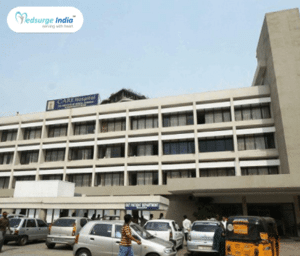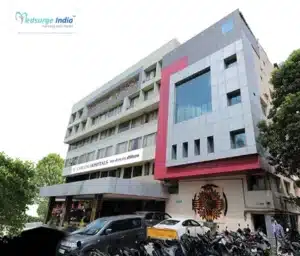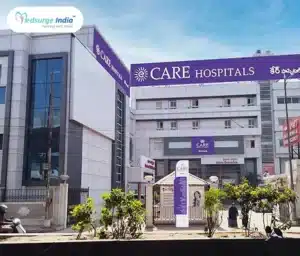Spine Tumour Surgery Cost in India
Unlock Exclusive Discount : Your Gateway to Premium Healthcare with Medsurge India Health Value Card.

Unlock Exclusive Discount : Your Gateway to Premium Healthcare with Medsurge India Health Value Card.


A spinal tumor is often a growth that develops within the spinal column or the spine’s bones. A cancer that occasionally affects the vertebrae in the spine is referred to as a vertebral tumor. Due to their rarity and frequent symptom overlap with more prevalent diseases, spinal tumors can occasionally go unnoticed.
The recommendation for spine tumor surgery is frequently made only after your doctor has determined what is causing your suffering. Your doctor may use imaging techniques including X-rays, CT scans, and magnetic resonance imaging (MRI) scans to do this.
Spine Tumor surgery in India is extremely reasonable when compared to other nations, including the USA. The country is renowned for providing high-quality, reasonably priced healthcare. For patients traveling for spine tumor surgery in India, the best facilities are available with inexpensive healthcare packages, top-notch medical equipment, and the assurance of excellent medical staff.
Spine tumor surgery cost in India starts from 4800 USD to 12,000 USD. The cost of spine tumor surgery in India can vary depending on the type of surgery, the city, and the hospital.
A spinal tumor is an abnormal mass of cell growth that develops either inside or outside of your spinal column and spinal cord.
The lengthy, pliable column of bones known as your spine (backbone) guards your spinal cord. Your tailbone, which is a portion of your pelvis, is where it stops after starting at the base of your head. Locations of spinal tumors include:
Malignant (cancerous) or benign (noncancerous) spinal tumors are also possible. Your spinal column’s various tissues may get harmed if the tumor spreads further. Primary spinal tumors are tumors that first appear on your spine or spinal cord. Metastatic or secondary spinal tumors are the result of cancer migrating to your spine from another part of your body. Compared to primary spinal tumors, metastatic spinal tumors are substantially more prevalent.
A spinal tumor is categorized depending on where it is in the spinal cord (within or outside the dura mater and inside or outside the medulla). Spinal tumors come in various forms, each with unique traits and requirements for care.
The three varieties of spinal tumors are as follows:
The size, precise location, and afflicted region of the spine are all important considerations for determining the symptoms of a spine tumor. Below are some of the symptoms you may experience:
Diagnosis For Spine Tumor Surgery in India
Your healthcare practitioner may request several tests, in addition to a physical and neurological examination, to determine whether a spinal tumor is present. These tests may include:
The ultimate goal of spinal tumor treatment is to remove the tumor thoroughly, however, this objective may be hampered by the possibility of long-term harm to the spinal cord and surrounding nerves. The doctor must also take into account your age and general health. When creating a treatment plan, the type of tumor and whether it originates from the spinal structures, or spinal canal, or has spread to your spine from another region of your body must also be taken into account.
Most spinal tumors can be treated in one of the following ways:
When you’re being examined for another ailment, it’s common to find certain spinal tumors before they create symptoms. Small tumors may just require close observation if they are not expanding or putting pressure on the tissues around them. Your doctor will advise routine CT or MRI scans to check the tumor during observation at a suitable interval.

This is frequently the preferred course of action for tumors that can be removed with a manageable risk of spinal cord or nerve damage. Neurosurgeons may now address tumors that were previously thought to be unreachable thanks to new methods and equipment. With the use of the powerful microscopes used in microsurgery, tumors, and healthy tissue may be distinguished more easily.
Additionally, throughout surgery, doctors can keep an eye on the spinal cord and other crucial nerves, reducing the likelihood that they may be harmed. Very high-frequency sound waves may occasionally be employed during surgery to fracture tumors and remove the pieces.
Know More:- Top 10 Spine Surgeons in India
The country has some of the best medical care facilities and services in Asia, making medical tourism in India very popular. The best Hospitals for Spine Tumor Surgery in India provide all types of disease-related surgeries using advanced technology. Also, Spine Tumor Surgery in India is much more affordable as compared to other states or nations around the world. An international patient can expect to pay 50-60% less for Spine Tumor Surgery in India.
The hospitals for Spine Tumor Surgery in India provide comprehensive appropriate treatment, including comprehensive pre-operative evaluations, minimally invasive surgical options, and post-operative rehabilitation programs. At these medical facilities, patients may anticipate personalized care, individualized attention, and compassionate treatment. Leading international agencies like the Joint Commission International (JCI) or the National Accreditation Board for Hospitals and Healthcare Providers (NABH) have accredited the hospitals.
Indian hospitals that perform surgery are well-known for their hospitality and patient care services providing the finest hospital and Spine surgeons in India. However, choosing a suitable hospital for treating Spine Tumor Surgery in India can be difficult for an international patient. It is a significant decision that must be made with several factors in mind, including:
Medsurge India is a prestigious support system for patients looking for doctors, hospitals, and specialized treatments. Our staff will provide you with a list of licensed, renowned, and trustworthy physicians and medical facilities in relation to your medical needs. Additionally, we offer a treatment strategy that fits your budget. Apart, we assist patients with obtaining travel authorizations, medical visas, and a multitude of other things.
A: Spinal cord cancers resemble brain tumours in appearance. Both are malignancies that originate in the central nervous system and have comparable sorts of malignancies.
A: Radiotherapy is mostly used to treat malignant cancers or cancers that are not surgically treatable. Only a small percentage of tumours are caused by this.

Neuro Spine Surgeon
Senior Consultant
14+ years
Gleneagles Hospital, Mumbai
View Doctor









By using our site, you agree to our Terms and Conditions, Privacy Policy and Refund Policy. Medsurge India provides reliable healthcare information and treatment options to support informed decision-making. Our content is designed to support and complement the guidance of your treating doctor, helping you feel informed and confident throughout your healthcare journey. We also Accept International Payments.

Copyright © 2025 NSM ONLINE SOLUTIONS PRIVATE LIMITED. All rights reserved.